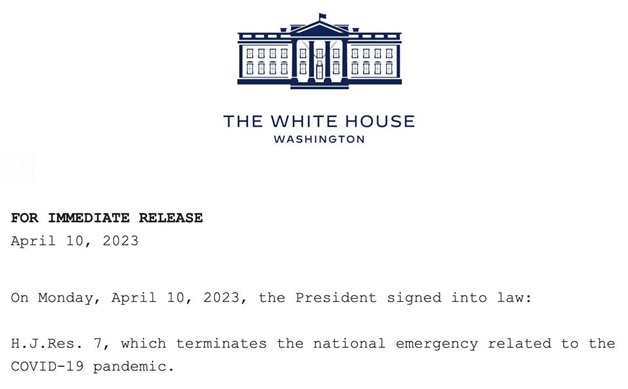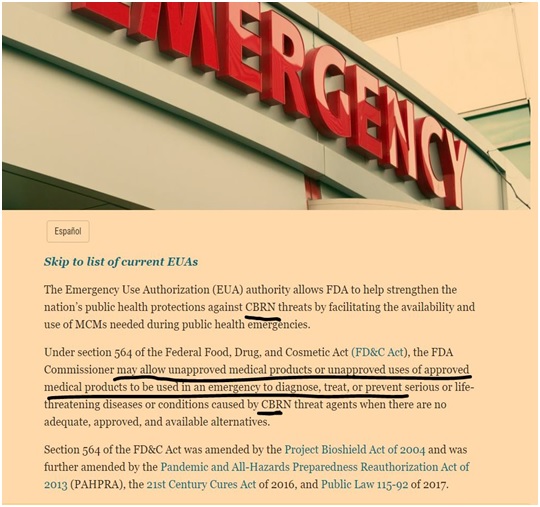by Maryam Henein, The Tenpenny Report:

After three years, the “emergency use authorization” has finally ended. But, wait. Not so fast.
On Easter Monday, on the same day the Biden Administration announced a new $5 billion plan to aid pharmaceutical companies in developing new COVID vaccines, Joey B. took a “significant and symbolic” step toward a POST Pandemic World, signing on H.J.Res 7, ending the three-year-long National COVID-19 “state of emergency.”
The resolution passed the House despite almost 200 Democrats voting against it. The White House originally expressed opposition to ending the COVID-19 emergency.
TRUTH LIVES on at https://sgtreport.tv/

“Is there a catch?” I immediately wondered. Why now? Did Robert F. Kennedy Jr.’s presidential announcement have something to do with it? Was the jig finally up? Was it because there is another emergency on the horizon?
Upon combing through the Ministry of Truth’s gobblygook, I got a headache. I usually can synthesize dense content, but I was very bewildered because the government sites seemed to say that the emergency was over, but not really. In other words, it looks like the official emergency is over but the deadly EUA lives on. In fact, the FDA is poised to approve a seventh dose of the COVID mRNA vaccine by emergency use authorization. (It may not have worked after six doses, but seven is a lucky charm.)
During my research, I asked Ryan Cristian of The Last American Vagabond if he had covered the topic, given his thorough reporting. He agreed it was designed to practically be impossible to understand. I have to admit, I was relieved to learn he was also confused and that it wasn’t a cognitive fart on my part.
“There is a lot of confusion about the EUA because there are actually a few different emergency declarations,” agrees Dani Lasher, President of Informed Choice Maryland.
The EUA was published in March 2020 based on an emergency declaration issued a month prior in accordance with the Federal Food, Drug, and Cosmetic (FD&C) Act.
“To my knowledge, that emergency declaration is independent of Biden’s emergency declaration and does not end just because Biden’s does, nor does the Public Health Emergency (PHE) first declared in January 2020 by the Secretary of Health & Human Services (HHS). That declaration is slated to expire in May,” says Lasher.
She is referencing HHS’s March 13, 2023 announcement that declared the COVID-19 public health emergency (PHE) under the Public Health Service (PHS) Act will expire on May 11, 2023.
An EUA declaration is distinct from and not dependent on a PHE declaration under section 319 of the PHS Act, and therefore EUA may remain in effect beyond the duration of the section 319 PHE declaration if all other statutory conditions are met.
Said in a different way, the PHE declared by HHS under the PHS Act will not impact the FDA’s ability to authorize devices, which includes tests, treatments, or vaccines for emergency use. Furthermore, existing emergency use authorizations (EUAs) for products will remain in effect and the agency may continue to issue new EUAs going forward when the criteria for issuance are met.
So if you are still following, the GOP bill to end the emergency does not truly end it. Seemingly there are several emergencies and several state emergency responses that have expiration dates that are not tied to the end of the federal emergency declarations.
Waivers will still be issued and EUA products will seemingly remain for eternity in violation of known federal law.
EUA Memory Lane
Before I attempt to parse the mind-bending Double Speak, I need to give you a little refresher on Emergency Use Authorization (EUA). First off, it’s really a humongous loophole to accelerate Big Pharma products that have not been fully vetted for (real) “safety.”

The official explanation is that EUA allows the use of medical products, such as vaccines and therapeutics, during public health emergencies, including pandemics, before they are fully approved by the FDA.
“Quick there’s a fire.” Oh wait, it’s a false fire. But quick, it’s still an emergency.
The EUA authority allows the FDA, based on the evaluation of available data, to authorize the use of unapproved or uncleared medical products following a determination and declaration of emergency, provided certain criteria are met. The authorization ends when the declaration of emergency is terminated or the authorization is revoked by the agency.
So basically, EUA products are NOT held to the same standards. It’s “FDA issued” vs “FDA approved.” This is a crucial distinction.
Meanwhile, the biggest audacity of the EUA is that it was all predicted upon “no adequate, approved, and available alternatives.”
Read More @ TheTenpennyReport.com




